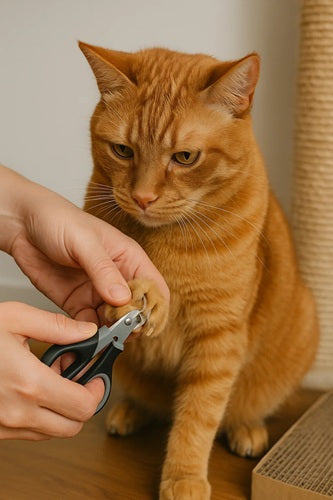How To Help A Skittish Cat open up
🐱 Complete Cat Care Guide
Building Trust and Confidence with Your Skittish Feline Friend
Understanding Your Skittish Cat
Some cats can be shy and fearful. While this may be the cat's temperament, there are some efforts that can be taken to help your cat open up and be more confident. Through these efforts you can build her trust and bond with you. A timid cat requires just a bit more care and socialization to help her warm up to you as well as to other people. Cats with skittish personalities might require a little extra care and attention from her pet parent. Let's understand how to help skittish cats be more relaxed and confident.
How Can You Help Your Skittish Cat?
You may have seen how your cat runs under the bed or hides whenever you have a visitor. There are several reasons why a cat could become timid or fearful, including loud noises, an unfamiliar home, strange or new objects, introduction to a new pet, a past trauma, etc. The causes are numerous but the solutions to help them become more confident are similar. Let us explore some ways to help your cat to open up:
Identifying the Cause
A skittish cat exhibits certain signs when she is uncomfortable. Observing these signs will help you understand what frightens her so you can address the cause and provide appropriate help. If you have adopted a cat, there is a possibility that she may have some deep embedded issues such as anxiety, need for isolation, fear of strangers- human or animal alike,etc that might trigger such behaviors.
Gain Your Cat's Trust
All cats are hesitant towards strangers so gaining their trust is essential. Skittish cats require more time to trust people. Gaining their trust would take some practice, you would need to observe their behavior and create strategies to get them more relaxed. Providing good meals, offering treats and being tender are some of the ways to win your cat’s trust.
Bond Through Playtime
As your timid feline begins to trust you and accepts the treats you offer, you can start introducing toys. Playtime will help your cat relax and open up. Skittish kitties may not approach you easily so you need to attract her attention. Choose toys that would catch her attention, spark her curiosity and excite her to come over to investigate. Don’t make sudden moves, allow her to sniff the toy and get used to them. Once she's intrigued and distracted with the toy, slowly pick it up and gently stroke her with it around the head and face (in case of soft toys). If your cat is receptive, use this opportunity to gently stroke her, helping her slowly become comfortable with human touch. Continue this for a few days. Gradually, as she gets comfortable, increase her playtime and engagement with the toys. This would increase her trust as well as allow her to be more at ease.
Minimize cause of stress
Skittish cats are often stressed out by loud noises, being petted by strangers, being confronted by other pets, etc. Such causes can lead to either negative behavior or an escape attempt. Minimizing exposure to activities that cause your cat stress would help her be more comfortable and less frightened. This is especially important in the early days. Gradually, as your cat grows older, you can increase certain exposures to make her more confident, depending on her personality.
Speak in a Soft Tone
When you are with your cat, keep your voice gentle and encouraging. Reassure her with your words, tone of voice and actions and let her know you mean her no harm. A soft tone will get through to her unlike a forceful or rough tone.
Don't Use Force
Holding your cat against her will or forcing her to play will increase her fear and anxiety. It’s the opposite of what you are trying to achieve. Getting her out of her shell is already a difficult task and forcing her will only make it harder. Don’t even pet or feed them with force. These types of actions can do irreversible damage.
Give Them Space
Never underestimate the power of space. Giving your skittish cat some space is important to strengthen the trust she has for you. Instead of going to her, let her come to you when she is ready. During that time, ensure that your cat has a safe place to escape to—set up a room with food, water, a litter box and a comfy spot to rest. It may take hours, days or even weeks before she is ready to approach you. Remember, whenever she makes an effort to come closer to you, don’t attempt to grab her as that will scare her and cause her to shrink away further.
Socialization
Helping a skittish Cat be socially active and warm with strangers will take time and effort. Begin slowly with one particular individual over an extended period. Ask a friend to come over everyday for a few days. Initially the friend should not interact with your cat at all. Allow your cat to get comfortable with your friend’s scent and presence. Your kitty will initially only observe from a distance, watching the interaction you share. As each day goes by, she’ll feel more confident and may come in the same room as your friend and stare at him. It is important not to pay attention to your cat at this stage as well. When your cat feels comfortable enough to come close, the friend can offer her a treat. If she is receptive, continue this for a few days, following which your friend could attempt to gently pet your cat on the head. At first she may be hesitant but will slowly let her guard down and allow your friend to pet her. This process may need to be repeated a few times with other people individually before she is comfortable enough to confront a group of people. The key is to be patient, gentle and give your cat as much time as she needs.
Observing the Outside World
It is essential for a cat to be in touch with her surroundings, indoors as well as outdoors. A skittish cat may not want to get out of the house at first and would prefer to be on her own. But allow her to observe the world outside by making a space for her on the window sill or balcony. When she is ready, you can take her out in her carrier but ensure she has visible access to the world outside. Let her take in the different elements of nature, the smells, the sounds and the different forms of life around her. Her curiosity will hopefully overcome her fear. In this way, she will eventually be able to open up and overcome her fears.
Every cat progresses at a different speed. Some cats come to appreciate humans quickly, while others take a long time before they can trust you. Don’t get discouraged if you have it the hard way. Remember, the most fundamental idea to keep in mind is that managing your timid cat takes a great deal of patience. Taking baby steps with your fearful feline will be the only way to ensure complete trust between the two of you. In the long run, the reward for your time and patience will be in the form of a confident, loving and purrfect companion.








